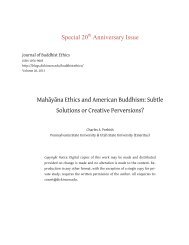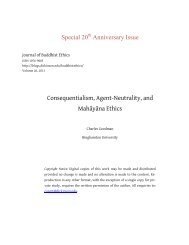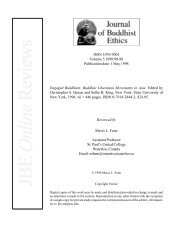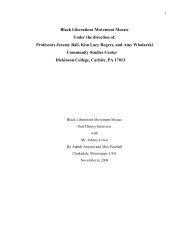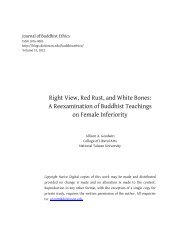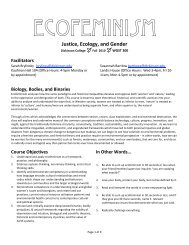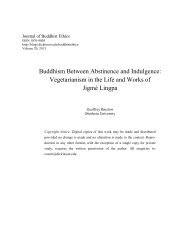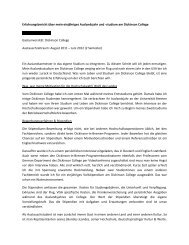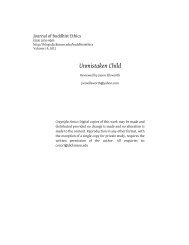Read article - Dickinson Blogs
Read article - Dickinson Blogs
Read article - Dickinson Blogs
You also want an ePaper? Increase the reach of your titles
YUMPU automatically turns print PDFs into web optimized ePapers that Google loves.
The opposites of these are the three "roots" of wholesome<br />
action: i) non-greed, covering states from small generous impulses<br />
through to a strong urge for renunciation of worldly pleasures; ii)<br />
non-hatred, covering friendliness through to forbearance in the face<br />
of great provocation, and deep loving kindness and compassion for all<br />
beings; and iii) non-delusion, covering clarity of mind through to the<br />
deepest insight into reality.<br />
While phrased negatively, these three are nevertheless seen as<br />
positive states. The importance of seeing the harmfulness of the<br />
unwholesome roots and the benefit of the wholesome ones is emphasised<br />
in a number of texts. The three roots of the unwholesome are seen as<br />
intertwined. Greed and hatred are grounded in delusion, and greed may<br />
lead to hatred. It is said that greed is a lesser fault, but fades<br />
slowly, hatred is a great fault, but fades quickly, and delusion is a<br />
great fault and fades slowly (A.I.200). This gives a clear indication<br />
of Buddhist values, especially the need to develop wisdom--analytically<br />
directed intuitive insight--so as to overcome delusion. It is also<br />
said that common motives for evil deeds are partiality, enmity,<br />
stupidity and fear (D.III.181-2), and that greed, hatred and delusion<br />
can each lead a person to abusing others with the thought "I am<br />
powerful" (A.I.201-02).<br />
The second type of criterion for what actions are unwholesome<br />
or wholesome concerns the anticipatable direct effect of the action in<br />
terms of causing suffering or happiness. This is shown by a passage<br />
where the Buddha advises that one should reflect before, during and<br />
after any action of body, speech or thought, to consider whether it<br />
might conduce to the harm of oneself, others or both, such that it is<br />
unwholesome and results in //dukkha//. If one sees that it will so<br />
result, one should desist from the action. If one sees that the action<br />
conduces to the harm of neither oneself nor others, nor both, it can<br />
be seen to be wholesome, with a happy result (M.I.415-16). The "harm"<br />
to oneself which is relevant here is spiritual harm, or material harm<br />
if this arises from self-hatred (e.g. by harsh asceticism, M.I.342-9):<br />
an act which benefits others at the expense of material harm to<br />
oneself is certainly not unwholesome. Harm to oneself is also seen to<br />
arise as an immediate result of unwholesome action: "One who is thus<br />
caught up, whose mind is thus infected, in the evil, unwholesome<br />
states born of greed... of hatred... of delusion, experiences<br />
suffering, stress, agitation and anxiety in this present life"<br />
(A.I.202).<br />
The third type of criterion for what is wholesome or<br />
unwholesome builds on the second. It concerns an action's contribution<br />
to spiritual development, culminating in Nirvana. Thus it is said that<br />
unwholesome conduct is that which causes injury, that is, having<br />
//dukkha// as fruit, due to leading to the torment of oneself, others<br />
Harvey.txt Page:143<br />
or both, and conducing to the arising of further unwholesome states<br />
and the diminution of wholesome ones: that is, having unhealthy<br />
effects on the psyche. Wholesome actions are of the opposite kind<br />
(M.II.114-15). Moreover, "wrong directed thought", for example, is<br />
said not only to conduce to the harm of self and other but to be<br />
"destructive of intuitive wisdom, associated with distress, not<br />
conducive to Nirvana", while "right thought" has the opposite effect<br />
(M.I.115-16).<br />
Overall, one can say that an "unwholesome" action is one that<br />
arises from greed, hatred or delusion (or a combination of these),<br />
leads to immediate suffering in others and/or oneself and thus to<br />
http://www.buddhistethics.org/2/harvey.txt<br />
3 of 11 4/5/2010 12:17 PM



